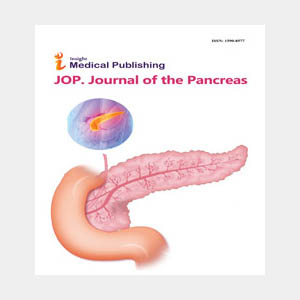Morphological and functional alterations of small intestine in chronic pancreatitis

CONTEXT:
The small intestine in chronic pancreatitis has not been investigated yet thoroughly. It would be important to understand fat metabolism in the course of this disease and could be explained if the small intestine has some pathological conditions and, due to this reason, pancreatic enzyme substitution does not work in all patients.
OBJECTIVE:
To investigate the pathophysiology of small intestine in chronic pancreatitis and to show the reason why in some cases pancreatic enzyme substitution does not work properly.
PATIENTS:
In the process of the study 33 chronic pancreatitis patients have been examined.
CONTROLS:
The control group includes 30 subjects without chronic pancreatitis similar for age, sex and alcohol consumption to the patients with chronic pancreatitis patients.
INVESTIGATIONS:
Aspiration biopsy of jejunum mucosa followed by histological examination and investigation of intestinal enzymes by aspiration has been performed.
MAIN OUTCOME MEASURES:
Metabolism at membranic level has been studied by enzymatic activity of amylase and lipase in the small intestine. Production of enzymes (monoglyceride lipase, lactase, saccharase, maltase, glycyl-l-leucine dipeptidase) promoting metabolism in enterocytes has been estimated as to their activity in homogenates of jejunum mucosa samples. Participation of mucosa in intestinal digestion has been assessed by alkaline phosphatase activity in a secretory chyme from proximal portion of jejunum. Absorptive capacity of jejunum was evaluated by D-xylose test results. DNA, lysozyme, immunoglobulin contents of chyme have also been calculated and bacteriological study of chyme has been also performed.
RESULTS:
Secondary enteritis, accompanied by moderate dystrophic changes of mucous membrane, thinning of limbus, and decrease of Paneth cell mitotic index, was found to occur in chronic pancreatitis patients. Enteritis is followed by changes in enzymatic processes in the sphere of membrane and intestinal digestion, decrease of absorption, accelerated desquamation of epithelium, fall in local immunity and development of bacterial overgrowth syndrome.
CONCLUSION:
Existence of secondary enteritis and bacterial overgrowth syndrome validates lack of enzyme replacement therapy efficacy in some chronic pancreatitis patients with pancreatic insufficiency. To optimize treatment in such cases it is important to perform small intestine decontamination and escalate enzyme preparation dosage.
JOP. 2018 Sep 10;13(5):519−28
Gubergrits NB, Linevskiy YV, Lukashevich GM, Fomenko PG, Moroz TV, Mishra T.
DOI: 10.6092/1590−8577/656.
